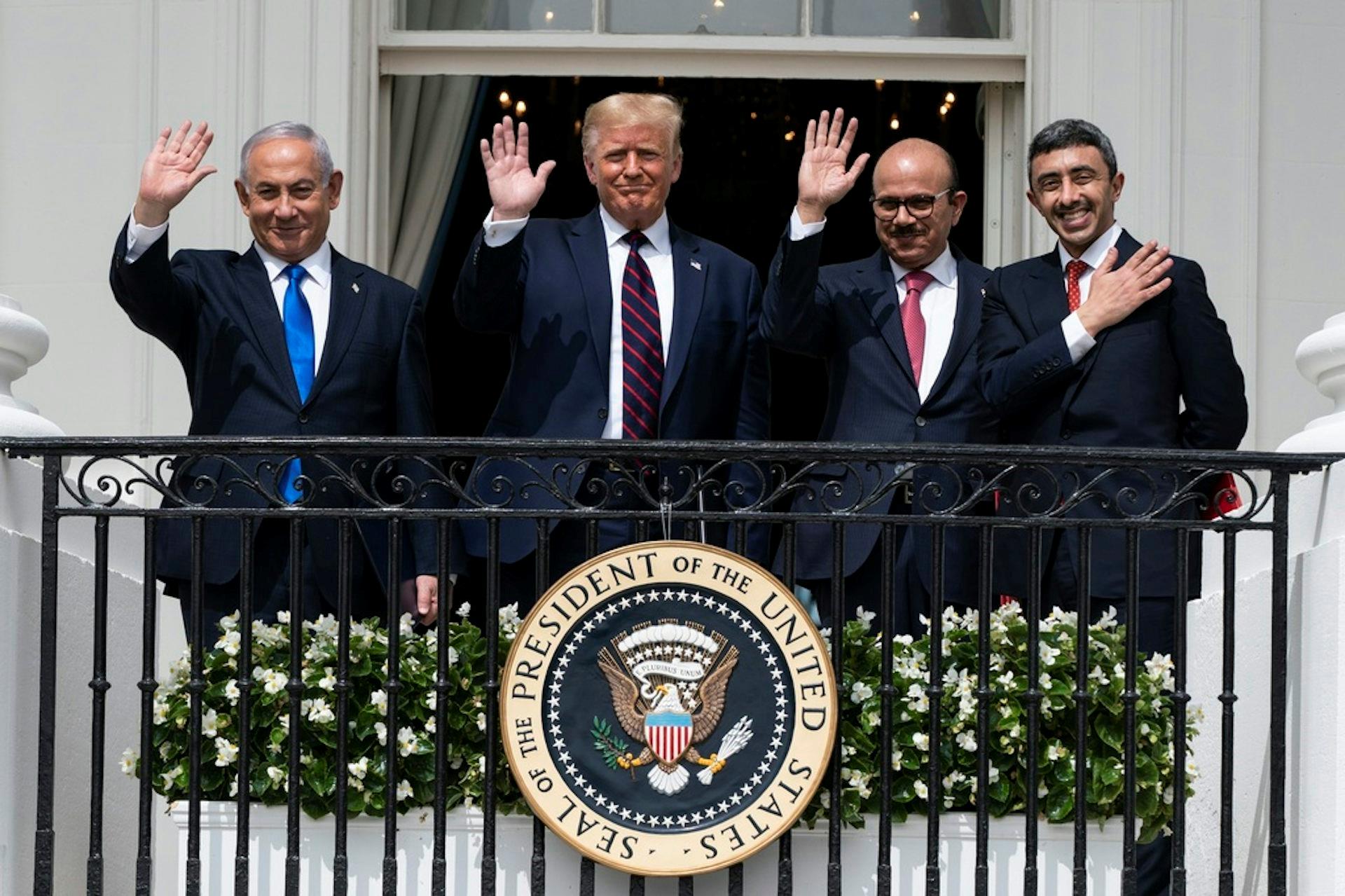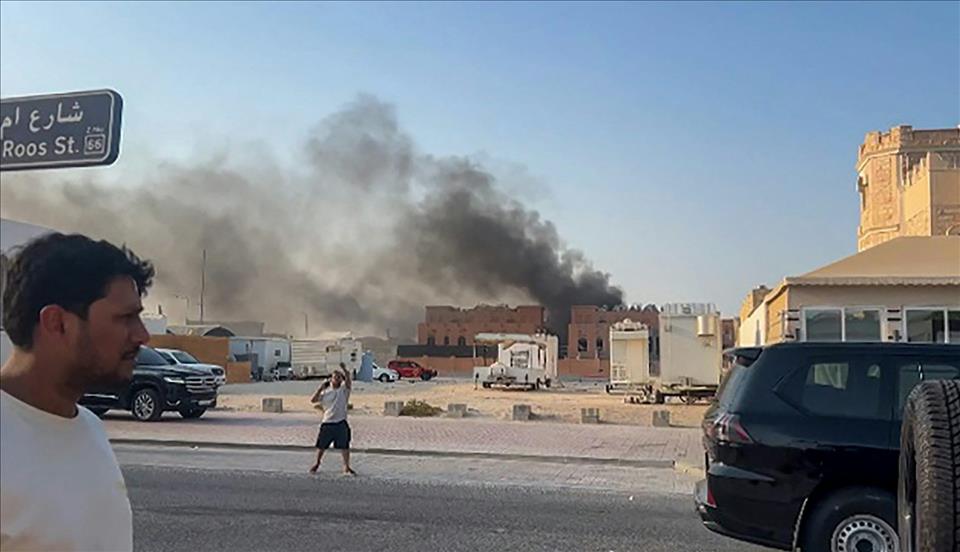Israeli Strike In Doha Crosses A New Line From Which Relations With Gulf May Not Recover
Resulting in the deaths of six people but seemingly failing to kill any members of Hamas' leadership , the strike was the first serious attack on the sovereignty of any of the six Gulf Arab states by Israel to date.
The bombing, which destroyed a building in a busy residential area of the Qatari capital, Doha, was also an act of international aggression under Article 2, paragraph 4 of the United Nations Charter. And it marks a major escalation in the post-Oct. 7, 2023, Israeli-involved conflicts across the Middle East.
But it isn't the first time Israel has targeted individuals being hosted by one of the Gulf States. In 2010, Israeli operatives were successful in killing a senior Hamas operative in the United Arab Emirates.
That operation in Dubai set back Gulf-Israel relations for years. Similarly, the impact of the Doha strike will be consequential for what remains of Israeli ties in the Gulf now, as well as for the web of U.S.-Arab Gulf state defense partnerships that have underpinned regional security for decades.
Indeed, as an expert on Gulf Arab politics , I believe the latest development represents the gravest crisis for Israel's budding relations in the Gulf.
The tangled history of Israel-Gulf tiesAside from a Saudi contingent that fought in the 1948 war, the Arab Gulf countries have not been direct military participants in the Arab-Israeli conflict. Rather, they have deployed resources in other ways, such as providing financial support to states actively involved in fighting Israel and participating in the 1973-74 Arab oil embargo .
In addition, the Gulf states maintained the Arab League boycott of Israel until the 1990s, when the secondary and tertiary aspects of the boycott – which targeted outside companies and third countries that did business with Israel – were gradually diluted. Formal ties also emerged in the 1990s, with Qatar and Oman leading the way in hosting Israeli trade offices and the latter receiving visits by two Israeli prime ministers: Yitzhak Rabin in 1994 and Shimon Peres in 1996. Gulf Arab countries also hosted multilateral meetings as part of the Oslo peace process that launched in 1993 between Israeli and Palestinian leaders.
And yet, Israeli outreach to the Gulf states has always been vulnerable to upswings of violence in the occupied Palestinian territories, which led to the closure of the trade missions in Muscat, the capital of Oman, and Doha in the 2000s. Ties reached their lowest ebb in January 2010 after the Israeli security service Mossad dispatched a 27-strong death squad to Dubai to assassinate Mahmoud al-Mabhouh, a senior weapons procurer for Hamas.
With Israeli operatives traveling into and out of the UAE using forged European and Australian passports, the killing infuriated the Emirati leadership and sent the discreet effort of building bilateral relations into a deep freeze for several years.
Ties only began to thaw in the turbulent aftermath of the Arab uprisings when Israel authorized the sale of sophisticated Pegasus spyware in 2013 as an“olive branch” to the UAE.
The subsequent upward trajectory of relations, which culminated in the signing of the Abraham Accords in 2020, illustrated how shared interests in regional geopolitics could act as a salve for bilateral antagonism. The accords, initially signed by Bahrain and the UAE, represented the first recognition of Israel by an Arab state since Jordan back in 1994.

A lot has changed in the Middle East since the 2020 signing of the Abraham Accords at the White House. AP Photo/Alex Brandon The gloomy diplomatic outlook after Doha
But it will be harder to repair ties this time around – not least because the strike on Doha comes after months of Gulf states' mounting concern at the extensive and open-ended scope of Israeli attacks across the Middle East and the ongoing war in Gaza, which most Arab Gulf leaders have described in genocidal terms.
Over the past year, Israel has hit targets in Lebanon, Syria, Iraq, Iran and Yemen. In the process, Israel has destroyed large areas of southern Lebanon; bombed the ministry of defense in Syria; killed Ismail Haniyeh , a former head of the Hamas political office in Doha; killed the prime minister of the Houthi-controlled government in Yemen and multiple members of his cabinet; and launched the 12-day war against Iran.
That pattern of behavior caused deep alarm among Gulf officials who have strenuously sought to“de-risk” the region as they focus on large-scale development projects such as Vision 2030 in Saudi Arabia.
The war with Iran was particularly emblematic of these regional fears. Indeed, it ended with an Iranian missile strike on Qatar that targeted Al Udeid, the largest U.S. air base in the Middle East and the location of the forward headquarters of U.S. Central Command. The June 23 strike appeared to be a choreographed face-saving measure of limited retaliation after President Donald Trump had ordered U.S. airstrikes against three nuclear facilities in Iran the previous day. But the sight of the Qatari night sky lighting up with interceptor fire and missile debris falling in Doha nevertheless caused shock waves in the Gulf.
It was the first time a Gulf capital had came under attack by a state, rather than a militant nonstate group, since Iraq launched Scud missiles during the Gulf War in 1991 following its invasion of Kuwait.
Qatar's Prime Minister and Foreign Minister Mohammed bin Abdulrahman al-Thani addresses a press conference following Israeli strikes in Doha on Sept. 9, 2025. Photo by Karim Jaafar/AFP via Getty Images Talk of diplomatic red lines
Iran's attack on the U.S. air base in Qatar in June generated statements of solidarity with Doha from all other members of the Gulf Cooperation Council, reflecting the degree to which the six Gulf Arab countries have come back together after the political rifts that divided them in the 2010s. The GCC has been most cohesive at times that its members perceive a common external threat, such as during the Iran-Iraq War in the 1980s. That has also been evident after Israel's military engagements since the Oct. 7, 2023, Hamas attacks.
Over the summer, alarm at Israel's regional wars led prominent Saudi commentators to describe Israel as a chief spoiler , a routine violator of international norms and a contributor to instability. Such language had previously been reserved primarily for Iranian actions.
Anwar Gargash, a foreign policy advisor to UAE President Sheikh Mohammed bin Zayed Al Nahyan whose name adorns the Diplomatic Academy in Abu Dhabi, described the Sept. 9 Israeli strike on Qatar as“treacherous .” It remains to be seen whether this is a red line which leads the UAE, or Bahrain, to suspend the Abraham Accords or break diplomatic ties with Israel.
Going forward, officials in Doha and other GCC capitals will be urgently assessing the implications of a strike by one U.S. partner and in the vicinity of a U.S. base meant to deter and detect regional aerial threats in the first place. And while the Trump administration has officially denied foreknowledge or involvement in the Israeli attack, even being caught in the dark will invite commentary about the apparent ineffectiveness of American deterrence and further damage Gulf states' confidence in the U.S. defense and security support.
When Israeli forces killed Haniyeh, another Hamas political leader, in July 2024, they waited until he left Doha to attend the presidential inauguration in Iran before they struck in Tehran. Until now, the assumption had been that Israel would hit targets in states adversarial to the U.S. rather than allies or partners.
That line has been crossed, and across the Gulf there will be concern about what else may happen – for example, to Houthi delegates being hosted in Oman.

Legal Disclaimer:
MENAFN provides the
information “as is” without warranty of any kind. We do not accept
any responsibility or liability for the accuracy, content, images,
videos, licenses, completeness, legality, or reliability of the information
contained in this article. If you have any complaints or copyright
issues related to this article, kindly contact the provider above.
Most popular stories
Market Research

- Bitmex And Tradingview Announce Trading Campaign, Offering 100,000 USDT In Rewards And More
- TOKEN2049 Singapore Breaks Records: 25,000 Attendees At The World's Largest Web3 Event
- Daytrading Publishes New Study On The Dangers Of AI Tools Used By Traders
- Next Generation Management Corp. (OTC: NGMC) Announces Strategic Shift Toward Digital Commerce Acquisitions
- What Is The Growth Rate Of The Europe Baby Food And Infant Formula Market In 2025?
- What Does The Europe Cryptocurrency Market Report Reveal For 2025?






















Comments
No comment